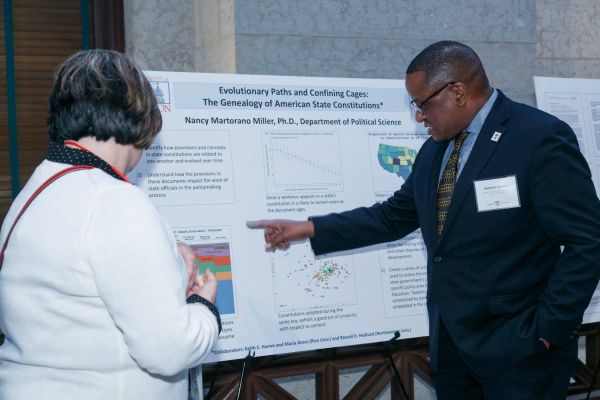University Libraries

OhioLINK Poster Child
By Maureen Schlangen
In an eight-year examination of the impact of state constitutions on state governments and state legislatures, UD political science professor Nancy Martorano Miller borrowed more than 100 crucial items from libraries across Ohio through OhioLINK, the statewide library consortium.
Miller, a member of the faculty since 2002, was one of several scholars selected to share snapshots of their research at OhioLINK’s 25th anniversary celebration and reception in the Statehouse atrium Nov. 1.
Miller readily extols the value of OhioLINK, which afforded her greater and faster access to more materials and documents than her colleagues in Texas and Massachusetts had.
“My collaborators and people at other universities are jealous,” Miller says. “If I need a book or other resource and UD doesn't have it, chances are an OhioLINK partner library does, and I have it in about two days.”
Throughout her scholarly career, Miller has explored the rights of minority political parties in the legislative process and the autonomy of state legislative committee systems. Her current state constitutions project is a collaboration with Keith E. Hamm, Edwards Professor of Political Science at Rice University, Ronald D. Hedlund, professor emeritus at Northeastern University, and Maria Aroca, a Rice doctoral student who joined the project in 2016.
Their work seeks to accomplish two goals, Miller says:
- Provide a better understanding of the evolution of state constitutions by studying the adoption, retention and modification of the constitution in a state over time as well as comparing the diffusion of ideas found in constitutions across states as the United States developed.
- Provide a better understanding of the extent to which detailed policy directives in a state’s constitution may constrain the ability of officials in that state to be responsive to citizen demand and potentially innovate in specific public policy areas.
It’s a challenging task. State constitutions aren’t consistent in their legal definitions, diction or structure. Historical context provides nuance seldom apparent when examining a document in a vacuum. And the sheer volume of the documents is staggering. In order to accomplish their goals, Miller and her colleagues have been experimenting with computational linguistics techniques that could both speed the process and allow them to interpret the documents more comprehensively and comparatively.
They have presented their research at conferences, given invited talks at other universities and published an article in the Albany Law Review. They are now preparing manuscripts for academic journals, outlining a book manuscript and seeking external grants to further their research.
MORE INFORMATION
- Read more about Nancy Martorano Miller’s research in her Expert Gallery profile.
- Browse the political science department’s scholarly publications.
— Maureen Schlangen is e-scholarship and communications manager in the University of Dayton Libraries. For information about eCommons, UD's institutional repository, contact her.


